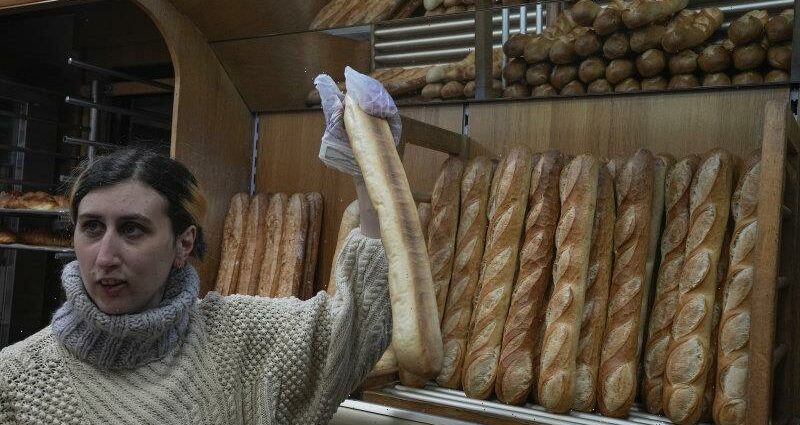London: The baguette, a symbol of France throughout the world, has been awarded special protected status by UNESCO to preserve the traditions of making the bread and the lifestyle that surrounds it.
The long, crusty loaf that has become a staple of French life was recognised by the UN body for the “artisanal know-how and culture of baguette bread” on its list of Intangible Cultural Heritage.
The humble baguette — the crunchy ambassador for French baking around the world — is being added to the UN’s list of intangible cultural heritage.Credit:AP
UNESCO chief Audrey Asoulay said its inclusion “celebrates the French way of life”, adding: “the baguette is a daily ritual, a structuring element of the meal, synonymous with sharing and conviviality.
“It is important that these skills and social habits continue to exist in the future.”
France has been losing some 400 artisanal bakeries a year since 1970, from 55,000 (one per 790 residents) to 35,000 today (one per 2,000) amid the spread of industrial bakeries and out-of-town supermarkets in rural areas, while those in cities are increasingly opting for sourdough or brioche burger buns.
Dominique Anract, the president of the National Confederation of French Bakery and Pastry, said it was a “recognition for the community of artisan bakers” and all those who had fought for it.
Mylene Poirier talks to a customer as she takes a baguette at a bakery, in Versailles, west of Paris.Credit:AP
“The baguette is flour, water, salt and yeast – and the savoir-faire of the artisan,” he said.
In 2017, the industry launched the process to register the artisanal skills and culture of the baguette amid fears the skills linked to its preparation could be lost to future generations.
French President Emmanuel Macron gave his “full and complete” support for the bid at the time, calling it a “250 grams of magic and perfection.”
Meaning “wand” or “baton”, more than six billion – about 16 million a day – are baked each year in France and sold at around €1 ($1.54) each.
Leclerc, a French supermarket, was earlier this year criticised by traditional bakers and farmers for its much-publicised 29-cent baguette, who accused it of sacrificing quality.
Since 1920 strict rules about what classed as a baguette have been in place, when a new law specified its minimum weight at 80 grams and maximum length 40 centimetres. The French government even regulated a fixed price until 1986. The dough must rest 15 to 20 hours at a temperature between 4 and 6 degrees, according to the French Bakers Confederation, which fights to protect its market from industrial bakeries.
Its origins are unclear, but one popular version is that the bakers of Napoleon Bonaparte came up with the elongated shape to make it easier for his troops to carry, while another credits Austrian baker named August Zang who invented the baguette in 1839.
“Initially, the baguette was considered a luxury product. The working class ate rustic bread that kept better,” Loic Bienassis, of the European Institute of Food History and Cultures, who helped prepare the UNESCO dossier, said.
“Then consumption became widespread and the countryside was won over by baguettes in the 1960s and 1970s.”
The baguette joins other foods and culinary cultures on UNESCO’s list of Intangible Cultural Heritage, including the making of Neapolitan pizza, kimchi, Belgian beer culture, the “Mediterranean diet”, and Arabic coffee.
Stephane Lacroix, from the French Yeast Trade Union Chamber, said what distinguished the French baguette from sourdough breads was the yeast fermentation and its lightness.
“Over the years, our French baguette has become the emblem of French excellence and is appreciated throughout the world thanks to the mastery of direct yeast fermentation and the know-how of our French bakers,” he said.
Get a note directly from our foreign correspondents on what’s making headlines around the world. Sign up for the weekly What in the World newsletter here.
Most Viewed in World
From our partners
Source: Read Full Article
-
‘She was wickedly funny’ Heartbroken Ivanka Trump pays tribute after mum Ivana dies at 73
-
Plans for King Charles’ death already being arranged in Operation Menai Bridge
-
Communication takeaways from Axios What's Next Summit
-
Putin ally could launch nuclear strikes on THREE countries including EU nation in new plot
-
The Arctic will have ice-free summers as soon as the 2030s



